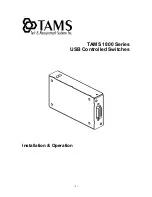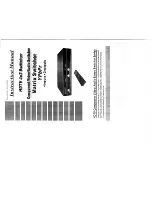
AS Series User Manual
29
Doc No.: AS5-0116-01
Green Ethernet
Port Power Savings
EEE is a power saving option that reduces the power usage when there is low or no traffic utilization.
EEE works by powering down circuits when there is no traffic. When a port gets data to be
transmitted all circuits are powered up. The time it takes to power up the circuits is named wakeup
time. The default wakeup time is 17 us for 1Gbit links and 30 us for other link speeds. EEE devices
must agree upon the value of the wakeup time in order to make sure that both the receiving and
transmitting device has all circuits powered up when traffic is transmitted. The devices can exchange
wakeup time information using the LLDP protocol.
EEE works for ports in auto-negotiation mode, where the port is negotiated to either 1G or 100 Mbit
full duplex mode.
For ports that are not EEE-capable the corresponding EEE checkboxes are grayed out and thus
impossible to enable EEE for.
When a port is powered down for saving power, outgoing traffic is stored in a buffer until the port is
powered up again. Because there are some overhead in turning the port down and up, more power
can be saved if the traffic can be buffered up until a large burst of traffic can be transmitted.
Buffering traffic will give some latency in the traffic.
Information
To configure the Green Ethernet Port Power Setting parameters via the Web Interface:
1.
Select Configuration > Green Ethernet > Port Power Savings.
2.
From the Optimize EEE for drop down box select whether to optimize power savings for
Latency or for Power Savings.
3.
Check the tick box next to the corresponding port to enable ActiPHY power savings.
4.
Check the tick box next to the corresponding port to enable PerfectReach power savings.
5.
Check the tick box next to the corresponding port to enable EEE power savings.
6.
Click Apply to confirm your settings change.
Summary of Contents for AS5010-P
Page 40: ...AS Series User Manual 39 Doc No AS5 0116 01 values...
Page 69: ...AS Series User Manual 68 Doc No AS5 0116 01 values...
Page 85: ...AS Series User Manual 84 Doc No AS5 0116 01 event...
Page 103: ...AS Series User Manual 102 Doc No AS5 0116 01 values...
Page 136: ...AS Series User Manual 135 Doc No AS5 0116 01 Example MSTI Configuration...
Page 160: ...AS Series User Manual 159 Doc No AS5 0116 01...
Page 175: ...AS Series User Manual 174 Doc No AS5 0116 01 Fig LLDP MED Configuration...
Page 192: ...AS Series User Manual 191 Doc No AS5 0116 01 values...
Page 199: ...AS Series User Manual 198 Doc No AS5 0116 01 member of all possible VLANs...
Page 213: ...AS Series User Manual 212 Doc No AS5 0116 01 Fig The IP Voice VLAN Configuration...
Page 224: ...AS Series User Manual 223 Doc No AS5 0116 01...
Page 228: ...AS Series User Manual 227 Doc No AS5 0116 01 Fig The Port Tag Remarking...
Page 237: ...AS Series User Manual 236 Doc No AS5 0116 01 Fig The DSCP Classification Configuration...
Page 240: ...AS Series User Manual 239 Doc No AS5 0116 01 Fig The QoS Control List Configuration...
Page 257: ...AS Series User Manual 256 Doc No AS5 0116 01 Fig The sFlow Configuration...
Page 401: ...AS Series User Manual 400 Doc No AS5 0116 01 default is 3...
Page 403: ...AS Series User Manual 402 Doc No AS5 0116 01 No Click to undo any restart action...
Page 415: ...AS Series User Manual 414 Doc No AS5 0116 01 Fig DMS Information Screen...
Page 418: ...AS Series User Manual 417 Doc No AS5 0116 01 Version Device firmware version...
Page 428: ...AS Series User Manual 427 Doc No AS5 0116 01 Fig the DMS Diagnostics Section...
















































